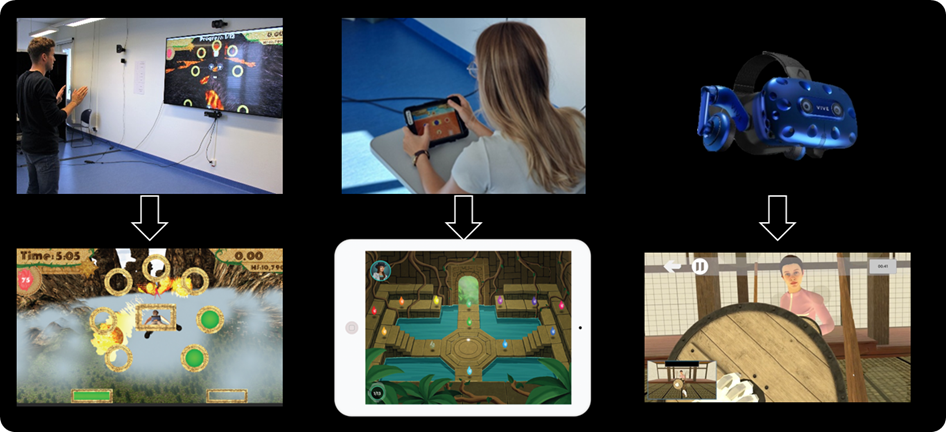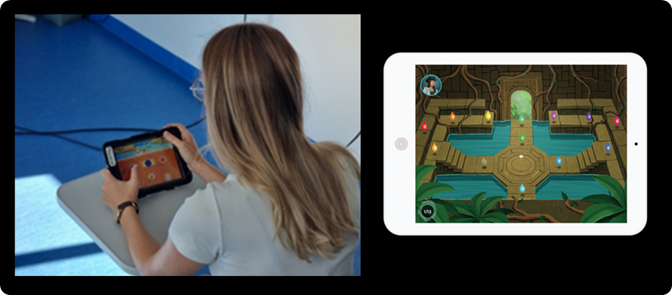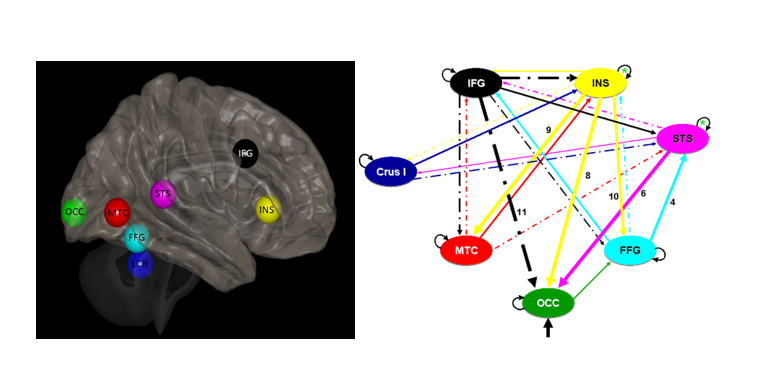Research axes
1. Serious video games for cognitive neurorehabilitation

In this line of research, the objective is to develop, assess and validate and implement innovating neurotechnology for cognitive neurology, neuropsychology and neurorehabilitation, such as closed-loop adaptive serious video games (including the cognitive exergame Body-Brain Trainer; Interventions and Diagnostics - Neuroscape) and immersive virtual reality (VR). intervention treatment designed to reduce cognitive deficits in patients with neurological conditions. The lab is equipped with VR devices, a driving simulator, an immersive giant screen, high-end computers, whole-body tracking and wearable physiological sensors. Research staff and collaborators consist of engineers, neuroscientists, neuropsychologists, physical therapists and neurologists with expertise in neurological rehabilitation. Interdisciplinary and multi-centric randomized controlled trials on novel cognitive neurorehabilitation are ongoing in multiple sclerosis (NCT03737825), HIV-related neurocognitive impairment and stroke.
Experts & Collaborators
Experts
- Dr Etienne Sallard
- Dr Petr Grivaz
- Charlène Moser
- Pauline Menoud
Internal collaborators
- Prof. Renaud Du Pasquier, Neurology Service, CHUV
- Prof. Caroline Pot, Neurology Service, CHUV
- Dr Marie Theaudin, Neurology Service, CHUV
- Prof.Matthias Cavassini, Division of Infectious Diseases, CHUV
- Prof. Vincent Gremeaux-Bader, Department of Sports Medicine and Institute of Sport Sciences (ISSSUL), University of Lausanne (UNIL)
- Dr. Jerome Barral, Institute of Sport Sciences (ISSUL), University of Lausanne (UNIL)
- Grégoire Eberlé, Head of physical therapy
External collaborators
- Prof. Adam Gazzaley, MD, PhD, Neuroscape Center, University of California San Francisco
- Prof. Joaquin Anguera, PhD, Neuroscape Center, University of California San Francisco
- Dr. Daniel Perez-Marcos, Mindmaze SA, Lausanne, Switzerland
Funding
Swiss National Science Foundation Swiss National Science Foundation (SNSF) (snf.ch)
Eurostars Program Eureka | Eurostars (eurekanetwork.org)
Faculty of Biology and Medicine, University of Lausanne Faculty of Biology and Medicine (FBM) - Université de Lausanne (unil.ch)
Selected publications
2. Serious video games for cognitive assessment

The objective is to validate novel technology-assisted approaches for cognitive screening and evaluation of neurological patients. Our lab is currently investigating the utility of the tablet-based closed-loop adaptive cognitive game ACE-X (Adaptive Cognitive Evaluation Explorer; https://neuroscape.ucsf.edu/researchers-ace/) as a screening instrument for executive deficits in stroke and memory clinic patients.
Experts & Collaborators
Experts
- Dr Etienne Sallard
- Marie Pittet
- Florian Sander
Internal collaborators
- Dr Andrea Brioschi Guevera, MER, Centre Leenaards de la mémoire
- Pr Gilles Allali, Centre Leennards de la mémoire
Funding
Internal funding
Selected publications
3. Social cognition

This line of research focuses on developing novel approaches for the assessment and neurorehabilitation of social cognition in patients with acquired brain damage. Around a third of patients with acquired brain injury suffer from deficits in social cognition, but their clinical management remains rather limited. We combine neuropsychological approaches, lesion-symptom mapping techniques and multimodal brain connectivity to uncover the cerebro-cerebellar circuitries underwriting social perception, cognition and behavior in neurotypical and neurological populations.
Experts
Dre Peggy d'Honincthun
Dr Jean-Michel Pignat
Marie Pittet
Funding
Swiss National Science Foundation (Swiss National Science Foundation (SNSF) (snf.ch))



